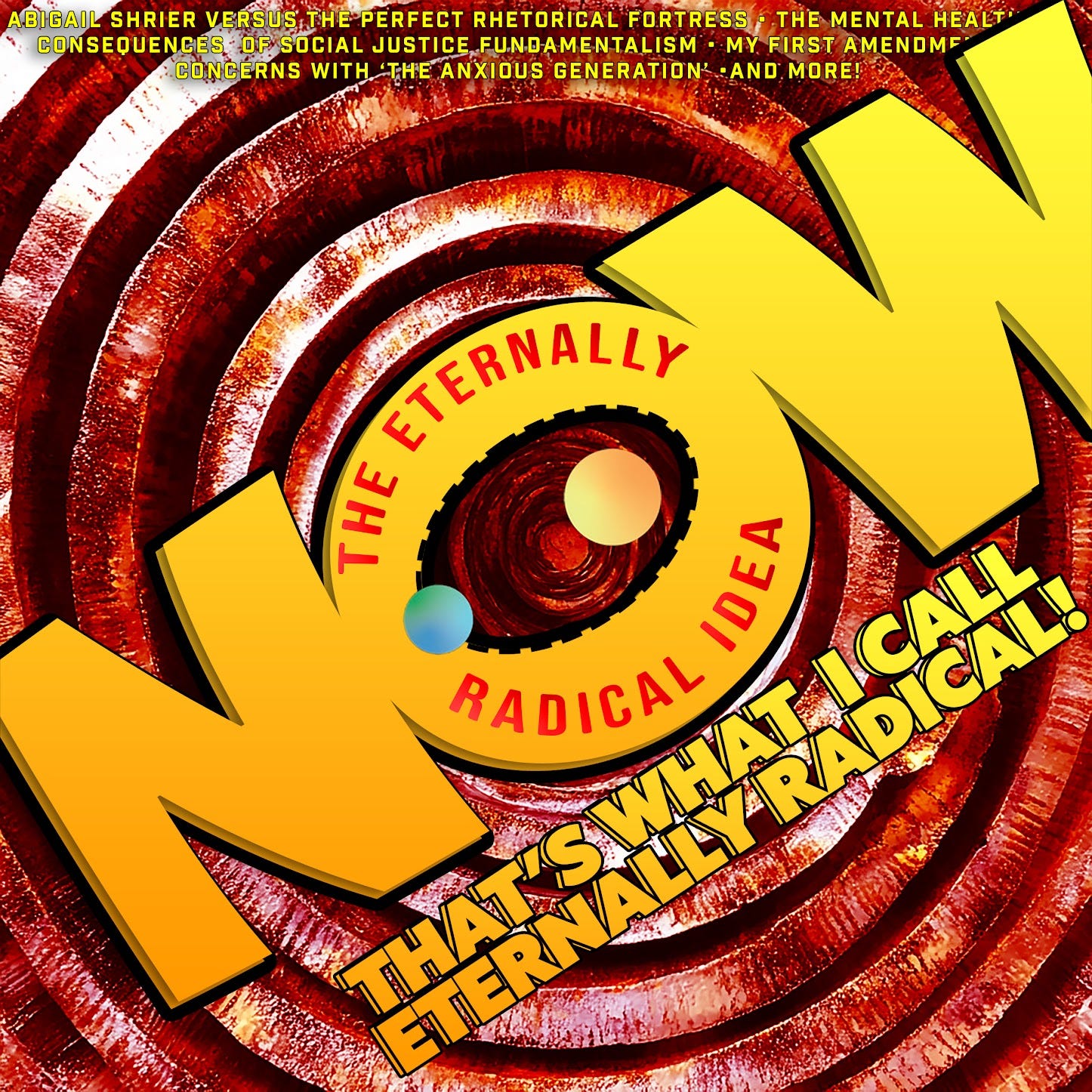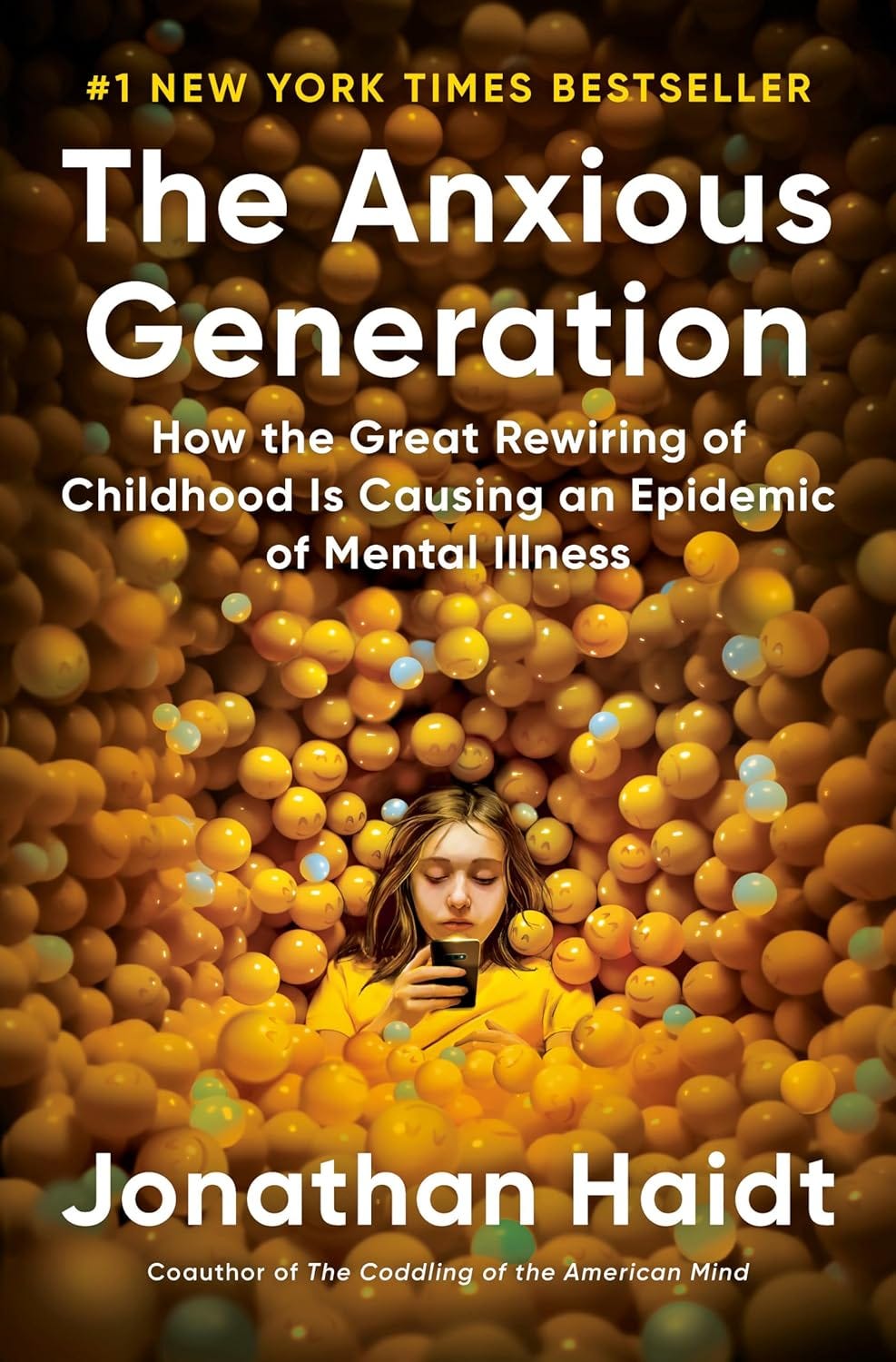The 5 top stories in ERI’s first year
More insights about your favorite posts
The Eternally Radical Idea is thousands of years old. (Still don’t know what the Eternally Radical Idea is? Tsk, tsk. Check out our first post.) But the Eternally Radical Idea Substack is one year old, and that’s pretty impressive too! In celebration, let’s take a look back at the five most popular posts and add a bit more insight to each.
1. Abigail Shrier versus the Perfect Rhetorical Fortress (Mar. 26, 2024)
“Bad Therapy” is simply a masterpiece — easily the most important book of the year. Unfortunately, it most desperately needs to be read by the very people who are likely most hostile to Shrier’s work. The book focuses on the harms of the therapeutic approach to raising our children and how the generation treated with the most psychological therapy and psychiatric drugs has become the most miserable, anxious, and disempowered generation on record. (“Disempowered,” by the way, was the original title of the book I wrote with Jonathan Haidt, which became “The Coddling of The American Mind.”)
[...]
Rikki and I describe this in detail in “Canceling,” but in short, the Perfect Rhetorical Fortress consists of a series of questions that serve as barricades to having an argument on its merits or substance. You’ll be amazed by how effectively each identity-related barricade of the Perfect Rhetorical Fortress allows anyone inside of it to cover their ears when they don’t want to meaningfully engage with an argument they don’t like.
Update: I’ve read the book an additional three times since this story, and as time goes on, I only appreciate it more. Rikki and I are hoping to work in some of that insight into the paperback edition of “The Canceling of the American Mind.”
Don’t forget, by the way, that while the Perfect Rhetorical Fortress exists to protect an ideologue from ever having to actually engage with the substance of a critical idea, the Conformity Gauntlet works to help those ideologues avoid ever engaging with anyone who has a critical idea in the first place. Ideological litmus tests in admissions, hiring, promotion, and tenure combine with constant policing by diversity administrators and the Bias Response infrastructure that surrounds them to create an impenetrable barrier to productive engagement.
As a recent NDSU survey revealed, this policing, censorship and self-censorship is by no means focused only on insults or intentionally offensive statements. It’s also directed at statements of opinion or fact within public debate. For example two statements that could get a professor reported by students are “Biological sex is a scientific fact. There are two sexes, male and female,” (which 21% of students said they would report) and “There are a wide variety of sexes. Sex is not a binary,” (which 10% of students said they would report). It doesn’t leave much daylight, does it?
2. The mental health consequences of social justice fundamentalism (May 21, 2024)
The graph above shows that as students move further to the left, they are more likely to have poor mental health — suggesting that it’s not just liberal ideology that impacts mental health, but also the extremity of their beliefs. Analysis of variance (ANOVA) tests show ideology is a statistically significant predictor of mental health. Post-hoc tests demonstrate it predicts in the direction as shown: more liberal, worse mental health. So far, the data is consistent with the findings of others (Zach Goldberg and Jon Haidt using Pew Research’s data, and Gimbrone et al.), and supportive of the hypothesis that “social justice fundamentalism” can be contributing negatively to the mental health of those who adopt it.
Update: We revisited these questions a few weeks later in our Q&A on sadness and social justice fundamentalism in ‘Plain English’. As I noted there:
… many studies reveal a correlation between political ideology and mental health:
A 2022 analysis of a nationally representative survey of 12th graders found that depressive affect is highest among female liberal students. Liberal male and female students scored higher on depressive affect than their conservative counterparts. It also found internalizing symptoms in general (depressive affect, self-esteem, self-derogation, and loneliness) is higher among girls.
The General Social Survey and Pew found a partisan gap in happiness with conservatives consistently reporting feeling happier than liberals since 1972.
More than 50% of college-aged liberal women said a doctor/healthcare provider has told them they have a mental health condition, whereas around 20% of conservative college-aged women said the same. An analysis of a March 2020 Pew survey showed a significantly higher percentage of liberals than conservatives responding “yes” to the question, “Has a doctor or other healthcare provider EVER told you that you have a mental health condition?”
3. My First Amendment concerns with ‘The Anxious Generation’ (Apr. 10, 2024)
However, as a free speech advocate and First Amendment lawyer, I believe some of Jon’s proposals that reach beyond norms and into government legislation go too far and would restrict free speech rights.
While his proposals appear on the surface to be aimed only at minors, in reality, they would implicate the rights of adults, too. What’s more, minors do have free speech rights, even if the breadth of those rights aren’t exactly the same as those of adults. I also think broad government interventions often create more problems than they solve and have a tendency to start in a sphere that seems limited but then expands. Lastly, I believe a good rule of thumb is to try the options that pose the least potential for abuse first.
Update: FIRE has long opposed restraints on media that would infringe on the expressive rights of minors, or on the rights of adults in the name of minors. For example:
We opposed the Kids Online Safety Act, which would have allowed the states and FTC to impose restraints on social media accounts for people under 17, functionally limiting the anonymous speech of adults by requiring them to verify their identity (to prove they’re not under 17).
Similarly, we have opposed laws in Florida and elsewhere that limit the age of social media users.
We opposed a Texas school district that banned books referencing “gender fluidity,” and a Florida district that removed books from the school library wholesale, rather than gating them by age-appropriateness.
We opposed a Utah city’s effort to ban pride displays in libraries.
I understand if some of this expression offends some Americans. However, I have to remind them that the alternative system — giving authority the power of censorship — results in outcomes worse than offense. Even when preventing harm to minors, we are constitutionally obligated to look for the least restrictive means first, and the intervention of a parent or guardian is always less restrictive than society-wide censorship.
4. Professor Mike Adams’ suicide still haunts me (Dec. 18, 2023)
I’ve seen people turn on professors and students that were once their friends and treat them as if they’d transformed into immoral monsters, deserving of only banishment or worse. I’ve felt that directed at me, my co-workers, and my friends. It creates a paranoia that everything can be stripped away from you if you make one wrong move, one wrong comment, one wrong joke. And once you transgress, you can be unpersoned into a caricature of societal evil, an object of scorn — no longer a real person, but an evil abstraction, sometimes a laughable cautionary tale.
Update: In February, when we announced “The Coddling of the American Mind” documentary, I had some advice for people who find themselves depressed and some reading to take away from it:
Are you thinking of harming yourself? If so, take any moment of clarity you have to immediately call a hotline, tell a friend, or get yourself admitted.
When you are in your most acute stage of depression, medication can be absolutely essential — and that’s why you have to talk to your doctor right away, get yourself checked into a clinic, and do whatever it takes to get through that particularly dark period.
Many people would also really benefit from working with a CBT-trained therapist. You would be amazed at how good your brain can be at constructing a narrative in which you’re broken and hopeless. A smart therapist can really help untangle that.
Here’s a reading list to supplement that advice, with a new addition:
“The Upward Spiral” by Alex Korb
“The Happiness Hypothesis” by Jonathan Haidt
“Outive” by Peter Attia
New addition: “It’s On Me” by Sara Kuburic, an interesting dive into the field of existential therapy.
5. Why the ‘words are violence’ argument needs to die (Jul. 19, 2024)
The notion that speech is violence fails to recognize the essential role of provocative speech and art, the revelation of harsh truth in science, and the reality of messy and distorted psychological states people can genuinely find themselves in. Most importantly, however, it is an affront to the foundation of our democracy and modern civilization. The bright line between action and speech is one of the best things humankind has ever devised, and it has been an engine for peace, progress, artistic achievement, and innovation for centuries. Without that line, representative government — not to mention the freedom to be our authentic selves without fear — is impossible.
Update: We recently updated this post to include the talk I gave at FIRE’s 2024 Student Network Conference:
Being a free speech advocate is hard, and maintaining a community around advocacy is harder. Sometimes, someone expresses a great deal of support for free speech when it’s their opponents who are being called out, but then they try to do the same unprincipled things and blame the free speech advocate for having principles. As ERI contributor Adam Goldstein has often said, “Anyone willing to build an altar to you will be willing to sacrifice you on it.” Untethered enthusiasm is fickle.
It is precisely that difficulty that makes me so appreciative of each and every one of you. Like free speech itself, The Eternally Radical Idea is never a fully safe space or a comfort read, even for those who love free speech. The people who have come with us on this journey, and who have chosen to stay, are the rare breed who can hold principles above their passions. I will never take that for granted. Thank you all.
Note: ERI's work would simply not be possible without amazing contributions by the ERI team, including Adam Goldstein, Perry Fein , and Angel Eduardo. Beyond a paid subscription to ERI (all of which goes to FIRE), one way to support their work and that of the group that makes this whole thing possible, please consider donating to FIRE. It's more important now than ever.
SHOT FOR THE ROAD
And while we are celebrating one year of ERI, I wanted to share again my favorite talk of the year — even though I look utterly ridiculous and that bandana on my neck is holding a handful of ice because I was so freaking hot. It’s also in many ways the most personal talk I’ve given. It was at the FIRE annual staff retreat, and I came clean to my staff about my warm and fuzzy feelings about them while also talking about some of the troubles I've had over the years, and also discoursing on the nature of love.
I know that sounds risky to do in front of your employees, but I swear, it all makes sense:









The most interesting aspect of the words are violence crew is that yelling at a Jewish student "intifada" or "from the river to the sea" both of which invite real violence and death seem to be ok.